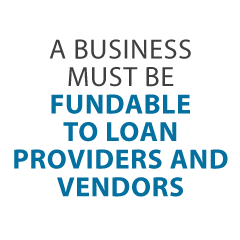- Connect With Us!
- (877) 600-2487
- info@creditsuite.com
The Annoying Truth: How Your Phone Number and Email Address Can Get You Denied for a Business Loan
Published By Janet Gershen-Siegel at October 9th, 2017
Denied? Again? Maybe it’s Your Business Phone Number and Email Address
When you are first starting out, setting up your business can seem daunting. You may be sorely tempted to just take something, anything, in order to be done with it already. But that can get you denied for a business loan.
So don’t! Setup is important. And your business can suffer if you do not take proper steps in the very beginning.
Denied? Your Phone Number is Key
Lenders perceive an 800 Number or toll-free phone numbers (such as with other legitimate area codes) as a sign of business credibility. Even if you are a single owner with a business based out of your home, a toll-free telephone number gives forth the perception that you are an even bigger company.
It is incredibly easy and inexpensive to set-up a virtual local phone number or one or more toll free 800 telephone numbers. In addition, you should have a fax number or e-fax. This is because there are still some instances where a business or an individual would want to send or receive a fax.
A cell or home phone number as your main business line could get you flagged as an un-established entity. Do not give a personal cell phone or residential phone as your business phone number.
Denied? Better Pay Attention to Directory Setup
With your brand new phone number in hand, what is the next step? You need to get it listed with 411. This is your business telephone number and also your business’s fax number. Why do you need these? It is because that kind of listing instantly builds and demonstrates business credibility. This is along with a professional website and a physical business address, plus any necessary licensure.
Your phone number must have a listing with 411 for most credit issuers and lenders to approve you. Check your record to determine if your small business has a listing. And make sure that your information is accurate. You can check here: ListYourself.net. If your business does not have a listing, ListYourself, Yext, D&B Credit Builder can help you get your business a listing.
Denied? Better Check Your Business Email Address
First, you will need to set up a website. Not to worry; these go hand in hand.
Denied? Then Spruce Up Your Business Website
Credit providers will research your company on the internet. It is in your best interests if they learned everything directly from your company website. This is a lot better than if they learn it from a competitor or from Yelp or any other ratings site. While you do need a presence on Yelp, it should not be your only web presence.
Not having a company website will severely hurt your small business’s chances of getting business credit or loans. By using places like TemplateMonster.com and Upwork.com, you can get a site up cheaply and quickly. And it will look decent, from the very beginning.
You will eventually want someone to design your site, particularly if you are not artistically inclined or you are not too savvy with this, or you just do not have the time. But for your business as you are getting up to speed, having a business website which looks good will go a long way.
And make sure you purchase hosting. Using a free WordPress site via WordPress (so the URL for your business would look something like yourbusiness.wordpress.com) does not inspire confidence in lenders. You can get your website hosted by a hosting company like Go Daddy or Host Gator.
Denied? With Your Own Website, Now You Can Get a Business Email Address!
This is because it is important to get a company email address for your business. This will usually come with your website domain. And it is either a small additional fee or your hosting provider will kick it in with your package. This is not only professional; it also greatly helps your chances of getting the thumbs up from a credit provider. Do not use a Yahoo, AOL, Gmail, Hotmail, or similar type of email for your business.
Find out why so many companies are using our proven methods to improve their business credit scores.
Denied? Then Build Business Credit as an Alternative
Business credit is credit in a company’s name. It doesn’t link to an owner’s consumer credit, not even when the owner is a sole proprietor and the only employee of the company.
Accordingly, a business owner’s business and consumer credit scores can be very different.
The Advantages
Given that small business credit is distinct from personal, it helps to safeguard a small business owner’s personal assets, in case of legal action or business bankruptcy.
Also, with two separate credit scores, a small business owner can get two different cards from the same merchant. This effectively doubles purchasing power.
Another advantage is that even startup companies can do this. Visiting a bank for a business loan can be a recipe for frustration. But building small business credit, when done the right way, is a plan for success.
Personal credit scores are dependent on payments but also various other factors like credit utilization percentages.
But for company credit, the scores really merely depend on whether a small business pays its bills timely.
The Process
Establishing company credit is a process, and it does not occur without effort. A small business will need to actively work to establish business credit.
Nonetheless, it can be done easily and quickly, and it is much speedier than developing personal credit scores.
Vendors are a big component of this process.
Doing the steps out of order will cause repetitive denials. No one can start at the top with company credit. For instance, you can’t start with retail or cash credit from your bank. If you do, you’ll get a denial 100% of the time.
Small Business Fundability
A small business must be fundable to credit issuers and merchants.
Due to this fact, a company will need to have all of the things already mentioned. These include a professional-looking website and email address, and website hosting. The same is true for the toll-free company telephone and fax numbers and their listing on ListYourself.net.
A company will also need a bank account dedicated strictly to it, and it must have every one of the licenses necessary for running.
Licenses
These licenses all have to be in the exact, appropriate name of the small business. And they must have the same company address and telephone numbers.
So bear in mind, that this means not just state licenses, but potentially also city licenses.
Find out why so many companies are using our proven methods to improve their business credit scores.
Working with the Internal Revenue Service
Visit the IRS web site and get an EIN for the business. They’re totally free. Pick a business entity like corporation, LLC, etc.
A business can get started as a sole proprietor. But they will most likely wish to change to a type of corporation or an LLC.
This is to limit risk. And it will make the most of tax benefits.
A business entity will matter when it pertains to taxes and liability in case of litigation. A sole proprietorship means the owner is it when it comes to liability and taxes. No one else is responsible.
Sole Proprietors Take Note
If you operate a small business as a sole proprietor, then at least be sure to file for a DBA. This is ‘doing business as’ status.
If you do not, then your personal name is the same as the small business name. Hence, you can wind up being personally liable for all business debts.
Also, according to the Internal Revenue Service, with this arrangement there is a 1 in 7 chance of an IRS audit. There is a 1 in 50 probability for corporations! Prevent confusion and dramatically decrease the odds of an Internal Revenue Service audit at the same time.
Instigating the Business Credit Reporting Process
Start at the D&B website and obtain a free D-U-N-S number. A D-U-N-S number is how D&B gets a business into their system, to generate a PAYDEX score. If there is no D-U-N-S number, then there is no record and no PAYDEX score.
Once in D&B’s system, search Equifax and Experian’s websites for the small business. You can do this at fastcs.wpengine.com/reports. If there is a record with them, check it for correctness and completeness. If there are no records with them, go to the next step in the process.
In this manner, Experian and Equifax will have activity to report on.
Vendor Credit Tier
First you ought to establish trade lines that report. This is also called the vendor credit tier. Then you’ll have an established credit profile, and you’ll get a business credit score.
And with an established business credit profile and score you can start to acquire credit in the retail and cash credit tiers.
These varieties of accounts often tend to be for the things bought all the time, like marketing materials, shipping boxes, outdoor work wear, ink and toner, and office furniture.
But first of all, what is trade credit? These trade lines are credit issuers who will give you initial credit when you have none now. Terms are normally Net 30, instead of revolving.
Therefore, if you get approval for $1,000 in vendor credit and use all of it, you will need to pay that money back in a set term, such as within 30 days on a Net 30 account.
You may have to apply more than once to these vendors.
Retail Credit Tier
Once there are 5 to 8 or more vendor trade accounts reporting to at least one of the CRAs, then progress to the retail credit tier. These are companies like Office Depot and Staples.
Only use your SSN and date of birth on these applications for verification purposes. For credit checks and guarantees, use the company’s EIN on these credit applications.
One good example is Lowe’s. They report to D&B, Equifax and Business Experian. They need to see a D-U-N-S and a PAYDEX score of 78 or more.
Fleet Credit Tier
Are there 8 to 10 accounts reporting? Then move onto the fleet credit tier. These are companies like BP and Conoco. Use this credit to purchase fuel, and to fix, and maintain vehicles. Only use your Social Security Number and date of birth on these applications for verification purposes. For credit checks and guarantees, make certain to apply using the company’s EIN.
One such example is Shell. They report to D&B and Business Experian. They want to see a PAYDEX Score of 78 or better and a 411 small business phone listing.
Shell may say they want a specific amount of time in business or revenue. But if you already have adequate vendor accounts, that won’t be necessary. And you can still get an approval.
Cash Credit Tier
Have you been responsibly managing the credit you’ve up to this point? Then move onto the cash credit tier. These are businesses like Visa and MasterCard. Only use your SSN and date of birth on these applications for verification purposes. For credit checks and guarantees, use your EIN instead.
One example is the Fuelman MasterCard. They report to D&B and Equifax Business. They want to see a PAYDEX Score of 78 or higher. And they also want you to have 10 trade lines reporting on your D&B report.
Plus, they want to see a $10,000 high credit limit reporting on your D&B report (other account reporting).
Additionally, they want you to have an established business.
These are businesses such as Walmart and Dell, and also Home Depot, BP, and Racetrac. These are usually MasterCard credit cards. If you have 14 trade accounts reporting, then these are in reach.
Find out why so many companies are using our proven methods to improve their business credit scores.
Monitor Your Business Credit
Know what is happening with your credit. Make certain it is being reported and fix any errors ASAP. Get in the practice of checking credit reports and digging into the particulars, and not just the scores.
We can help you monitor business credit at Experian and D&B for only $24/month. See: fastcs.wpengine.com/monitoring.
Update Your Record
Update the relevant information if there are inaccuracies or the information is incomplete.
Fix Your Business Credit
So, what’s all this monitoring for? It’s to contest any inaccuracies in your records. Mistakes in your credit report(s) can be fixed. But the CRAs often want you to dispute in a particular way.
Disputing credit report errors generally means you send a paper letter with duplicates of any evidence of payment with it. These are documents like receipts and cancelled checks. Never send the original copies. Always mail copies and retain the originals.
Fixing credit report mistakes also means you precisely detail any charges you dispute. Make your dispute letter as crystal clear as possible. Be specific about the issues with your report. Use certified mail so that you will have proof that you mailed in your dispute.
A Word about Building Business Credit
Always use credit smartly! Never borrow more than what you can pay off. Keep an eye on balances and deadlines for payments. Paying off promptly and completely will do more to boost business credit scores than almost anything else.
Growing business credit pays. Great business credit scores help a small business get loans. Your lender knows the business can pay its financial obligations. They know the business is bona fide.
The business’s EIN connects to high scores and lending institutions won’t feel the need to demand a personal guarantee.
Business credit is an asset which can help your business for many years to come.
Denied? What Your Lender Thinks
Consider the lender’s perspective. They want assurances that you will pay your bills on time and will not skip town. Without a listed phone number, or a professional email address, they will see you as fly by night. You definitely do not want that. Your phone number and email address can get you denied. Or you can make them work for you.

 " class="attachment-blog-single size-blog-single wp-post-image" alt="Get Business Credit Cards for New Businesses Credit Suite-Business Line of Credit Decoded" title="Get Business Credit Cards for New Businesses">>
" class="attachment-blog-single size-blog-single wp-post-image" alt="Get Business Credit Cards for New Businesses Credit Suite-Business Line of Credit Decoded" title="Get Business Credit Cards for New Businesses">>
